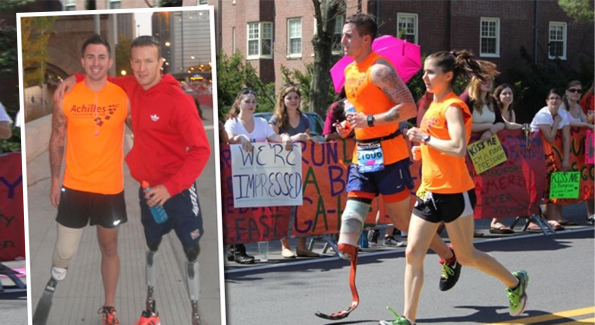Despite losing his leg in Afghanistan, war veteran Matt White prepares for his next marathon.
By Anne Kim-Dannibale
Photos courtesy Achilles International

Inset photo: Sgt. Matt White with mentor Richard Whitehead, who won a gold medal for Great Britain in the 2012 Paralympics. Main photo: Sgt. White at full speed.
In May of 2010, Sgt. Matt White was serving on a combat patrol with the U.S. Army’s 82nd Airborne in Afghanistan when he stepped on an IED. The blast caused him to lose his right leg. After a year-long recovery process, the Washington native turned around and decided to run a marathon.
On the eve of his next run — the Disney World Marathon’s half marathon, Jan. 10-13 — with Achilles International, White, 24, discussed his injury and his unstoppable determination to conquer the road.
What was your mission when you were struck by a roadside bomb? What was the recovery process like?
On May 8, 2010 I was on a dismounted combat patrol in the Arghandab River Valley in Afghanistan. After completing our mission we were headed back to our base, this is when I stepped on an IED after jumping over a wall. After the blast I was MEDEVAC to Walter Reed Army Medical Center in Washington, D.C. After the amputation of my right leg below the knee, my recovery started immediately. I worked with my physical therapist everyday. We would do countless exercises to get me back up and walking again. We usually worked together for about two hours a day, then on my own.
I would go to the gym and lift weights, swim and run. After a year of physical therapy I completed my first full marathon, the Chicago marathon.
Why did you join the military and how long did you serve?
I was never really challenged in high school and when I was weighing my options for post education I knew I wanted something unexpected. The military just so happened to fill all my criteria.
It’s both mentally and physically enduring, no two days were ever going to be the same. I served in the army for five years.
Did you run marathons before joining the military?
I’ve always been athletic and enjoyed running, but training for a marathon was never a priority.
What made you decide to start running?
I wanted to be active like I used to. Some of the things that I used to do, like playing sports, were not realistic. I needed to find something else and running was that something else. I took baby steps. I thought that I would be able to start as soon as I got my running prosthetic, but that was not the case. It took many weeks for me to be able to start and it took a lot more energy. At first, running one lap around the track was the most that I could do. Now I can run several laps like it is nothing.
I really didn’t have any plans or goals with running before I met the Achilles staff. They told me about what they do and how they could help me run in major events. When I heard this, it motivated me to start running more. My first race with Achilles was a 5-mile race. Now I am running marathons and half marathons.
Why did you join the Achilles International Freedom Team?
Joining Achilles International’s Freedom Team has given me the opportunity to participate in highly recognized events that otherwise I would not have been able to compete in. Being an example to others that have any desire to accomplish a marathon or even a mile with their injury is something that motivates me to continue competing.
How long did you train for your first marathon?
My first marathon took about six months of training. I ran in the morning before class.
The distance varied from 5-18 miles, I also did low-impact cardio like the elliptical and stationary biking.
Tell us more about your prosthetic. It looks very advanced.
The running prosthetic that I run on is called a Cheetah. I have been running with this particular prosthetic for about a year an a half now. As you can see, it has a back-mounted spring that gives me plenty of spring. I have other running prosthetics, but this one works the best for me.
Who is your biggest influence/inspiration and why?
For day-to-day training, my competitiveness is influenced the most by Richard Whitehead [a double amputee and world record holder for Great Britain]. Having him at the first marathon I ran (Chicago 2011) supporting me, knowing everything he has accomplished was the push I really needed. He is a constant reminder that running a marathon is something you have to build up to, it’s not something you can just decide to do one day. It takes persistent hard work and dedication.
What are you hoping to accomplish next?
My next accomplishment through the team is to run the 2013 NYC marathon, without the Achilles Freedom team it would not be possible. On a more personal side, I’m looking forward to working in the medical field after completing nursing school at Catholic University of America in the spring of 2015.
